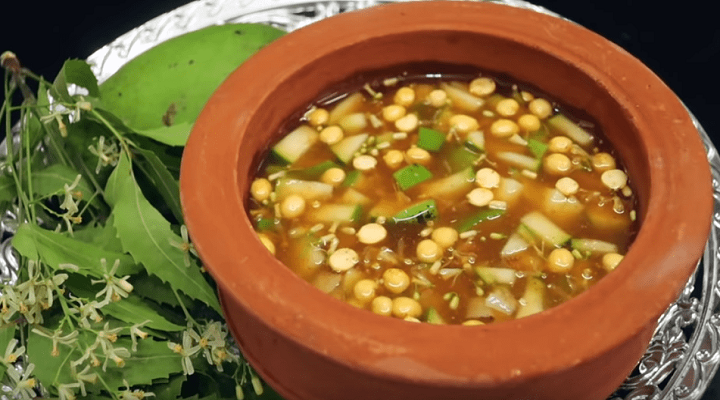Ugadi, celebrated as the New Year in the Deccan region of India, marks the onset of a new era, a time for new beginnings and renewed spirits. A prominent element of this festive celebration is “Ugadi Pachadi,” a unique concoction that blends various flavors and textures to create a dish that mirrors life itself – a blend of sweet, sour, bitter, and more. In this article, we will delve into the traditions, symbolism, and significance of Ugadi Pachadi, uncovering the layers of meaning behind this delightful preparation.
Contents
The Essence of Ugadi Pachadi
Ugadi Pachadi is a chutney-like mixture made with an assortment of ingredients that represent different facets of life. It is a harmonious blend of six tastes – sweet, sour, bitter, salty, tangy, and spicy, which symbolize the various emotions and experiences one encounters throughout the year.
The Ingredients and Their Symbolism
Neem Buds (Bitter): Neem buds, a key ingredient, represent bitterness – symbolizing the inevitable challenges and hardships that life presents us. Just as the neem leaves are bitter yet beneficial, life’s difficulties too bring valuable lessons.
Raw Mango (Sour): The sourness of raw mango signifies the tangy moments in life – the ups and downs that add flavor to our journey. It reminds us that both joy and sorrow are integral to our experiences.
Tamarind (Tangy): Tamarind, with its tangy taste, reflects the surprises and unexpected turns that life takes. Just as tamarind adds an element of surprise to the pachadi, life often springs surprises that shape our paths.
Jaggery (Sweet): The sweetness of jaggery symbolizes happiness, joy, and contentment. It reminds us to cherish the moments of sweetness in our lives and spread positivity to those around us.
Green Chilies (Spicy): The spiciness of green chilies represents the challenges and difficulties that bring a certain fire to life. Just as spice adds intensity to a dish, challenges add depth to our character.
Salt (Salty): The presence of salt signifies stability and balance. It reminds us to maintain equilibrium in our lives, even when faced with extremes.
The Ritual of Preparing and Consuming Ugadi Pachadi
The preparation of Ugadi Pachadi is a ritualistic affair, often involving the entire family. Each ingredient is carefully added to a bowl, symbolizing the acceptance of various life experiences. The pachadi is then served and consumed by all members, emphasizing the unity and shared experiences that life brings.
The Philosophical Underpinnings
Ugadi Pachadi not only celebrates the diverse flavors of life but also imparts profound philosophical teachings. It teaches us the art of embracing life in all its dimensions – the bitter, the sweet, the sour, and the spicy – with equanimity and grace.
Beyond the Plate: Cultural and Social Impact
Ugadi Pachadi is not just a culinary delight; it holds cultural and social significance as well. It is a unifying factor that brings families and communities together to celebrate the New Year. The act of sharing and consuming the pachadi reinforces the values of togetherness and harmony.
Contemporary Adaptations and Innovations
In recent times, there have been creative interpretations of Ugadi Pachadi, showcasing the dynamism of tradition. Some variations incorporate additional ingredients to reflect changing tastes and preferences while keeping the core symbolism intact.
Conclusion
Ugadi Pachadi is not merely a mixture of flavors; it is a reflection of life itself – a beautiful amalgamation of experiences, emotions, and lessons. As we savor each taste in the pachadi, we are reminded of the impermanence and beauty of existence. This humble dish teaches us to embrace life’s varied flavors with grace and resilience, offering a profound lesson in the art of living. So, as you partake in Ugadi celebrations, let Ugadi Pachadi be a reminder of the richness that life has to offer, and may it inspire you to navigate the upcoming year with courage, joy, and an open heart
